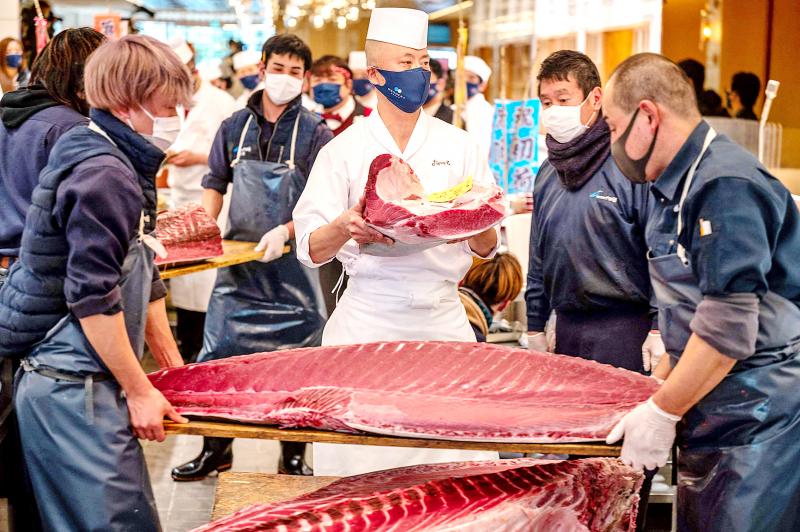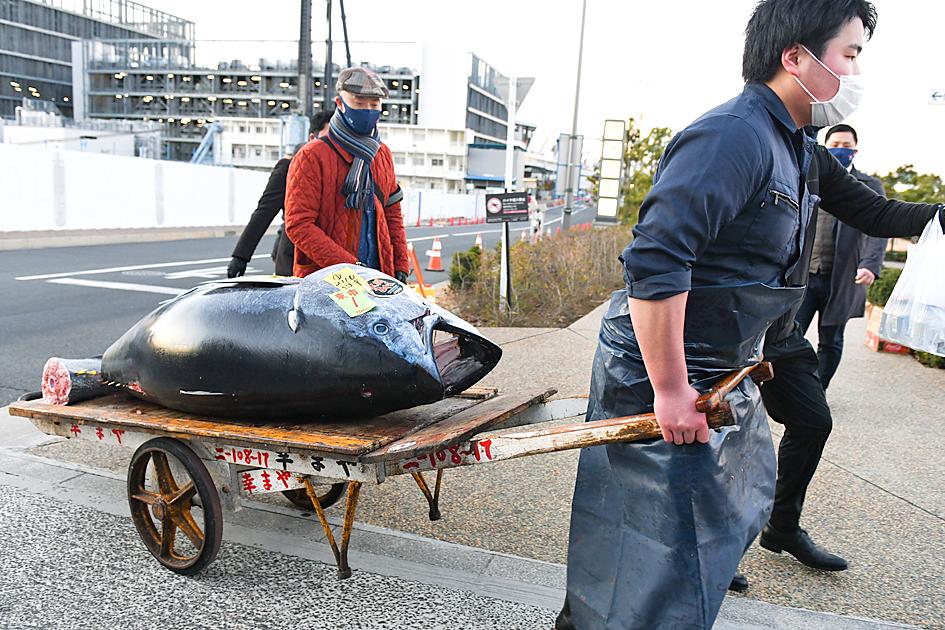The buyer of a US$145,000 tuna at Tokyo’s first auction of the year yesterday said he hoped that the purchase would “brighten” a year hit by the COVID-19 pandemic.
The top price paid for a tuna at the traditional opening auction at Tokyo’s Toyosu Fish Market fell for a third consecutive year, as demand was affected by the pandemic.
The ¥16.88 million shelled out yesterday by a restaurant operator and a wholesaler for the blue fin tuna was far below the 2019 record of ¥333.6 million.

Photo: AFP
The Toyosu auction is a closely watched tradition that draws a horde of fish wholesalers at the beginning of each year.
Bidders sometimes shell out an enormous amount to win the top-priced tuna, which is seen as bringing good luck, as well as plenty of publicity for the buyer.
Yesterday’s top-priced 211kg fish was caught off the northern Aomori region of Japan, famous for its quality tuna, and went to Michelin-starred sushi restaurant operator Onodera Group and Japanese wholesaler Yamayuki.

Photo: Bloomberg
Hours after the early-morning auction, the prize fish was delivered to a restaurant operated by Onodera in Tokyo’s upscale Omotesando neighborhood to be publicly sliced and filleted.
“I participated in the auction hoping to get the top-priced tuna, which is considered auspicious, and serve it to our customers to brighten their year ahead a little, even as our world remains marred by the pandemic,” head chef Akifumi Sakagami said.
The tuna is to be offered to customers in Japan and at the firm’s restaurants abroad, including in Hawaii, New York City and Los Angeles, he added.
Sushi enthusiasts gathered outside the upscale Tokyo restaurant to await the tuna, eager for a morsel.
Junko Kawabata, 78, said she had taken the expressway from her home in eastern Tokyo for the opportunity to taste the top-priced catch.
“I just love tuna,” she said, proudly displaying a numbered ticket indicating she would be the first customer to be served. “I can’t wait to eat a piece of it.”

To many, Tatu City on the outskirts of Nairobi looks like a success. The first city entirely built by a private company to be operational in east Africa, with about 25,000 people living and working there, it accounts for about two-thirds of all foreign investment in Kenya. Its low-tax status has attracted more than 100 businesses including Heineken, coffee brand Dormans, and the biggest call-center and cold-chain transport firms in the region. However, to some local politicians, Tatu City has looked more like a target for extortion. A parade of governors have demanded land worth millions of dollars in exchange

An Indonesian animated movie is smashing regional box office records and could be set for wider success as it prepares to open beyond the Southeast Asian archipelago’s silver screens. Jumbo — a film based on the adventures of main character, Don, a large orphaned Indonesian boy facing bullying at school — last month became the highest-grossing Southeast Asian animated film, raking in more than US$8 million. Released at the end of March to coincide with the Eid holidays after the Islamic fasting month of Ramadan, the movie has hit 8 million ticket sales, the third-highest in Indonesian cinema history, Film

Taiwan Semiconductor Manufacturing Co’s (TSMC, 台積電) revenue jumped 48 percent last month, underscoring how electronics firms scrambled to acquire essential components before global tariffs took effect. The main chipmaker for Apple Inc and Nvidia Corp reported monthly sales of NT$349.6 billion (US$11.6 billion). That compares with the average analysts’ estimate for a 38 percent rise in second-quarter revenue. US President Donald Trump’s trade war is prompting economists to retool GDP forecasts worldwide, casting doubt over the outlook for everything from iPhone demand to computing and datacenter construction. However, TSMC — a barometer for global tech spending given its central role in the

Alchip Technologies Ltd (世芯), an application-specific integrated circuit (ASIC) designer specializing in server chips, expects revenue to decline this year due to sagging demand for 5-nanometer artificial intelligence (AI) chips from a North America-based major customer, a company executive said yesterday. That would be the first contraction in revenue for Alchip as it has been enjoying strong revenue growth over the past few years, benefiting from cloud-service providers’ moves to reduce dependence on Nvidia Corp’s expensive AI chips by building their own AI accelerator by outsourcing chip design. The 5-nanometer chip was supposed to be a new growth engine as the lifecycle